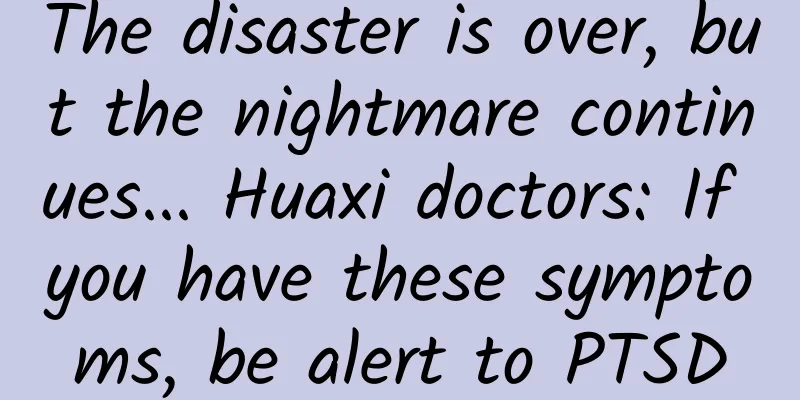The disaster is over, but the nightmare continues... Huaxi doctors: If you have these symptoms, be alert to PTSD

|
Today we will teach you a new word: PTSD Also called post-traumatic stress disorder. As a medical term, it is now used to describe various "phobias", such as work PTSD for workers. The specific manifestations are: My head hurts when I think about going to work, I doze off when I walk into the office, my legs and hands feel weak when I sit down at my workstation. Many faces with lifeless eyes and a sense of despair are "taken collectively". Jokes aside, Chief Physician Zhang Jun from the Mental Health Center of West China Hospital of Sichuan University and the 2021 five-year clinical students of West China School of Clinical Medicine: Yu Jie and Wang Haosheng have decided to have a serious talk with you today about the topic of "Post-traumatic Stress Disorder (PTSD)". ▽ First let’s get to know What is Post Traumatic Stress Disorder? The so-called post-traumatic stress disorder (PTSD) refers to a mental disorder that occurs with a delay and lasts for a long time after encountering an extraordinary threat or disaster, also known as a delayed psychogenic reaction. Does it sound awkward and difficult to understand? In fact, to put it bluntly, it means personally experiencing or witnessing violent crimes, serious traffic accidents, major natural disasters, technological disasters, wars, etc., which then have a profound impact on the fragile mind and spirit. Take the recent serious stampede in Itaewon, South Korea, for example. Whether you experienced it on the spot or watched the scene through the video on the Internet, the psychological trauma is left behind: "When I walked out of the bar, I was faced with a row of corpses..." "I felt like I was being crushed to death. I was crying while I was breathing." "I climbed the mountain on a beer crate and got away from the crowds for a while. This was the closest I've ever been to death." "The Itaewon tragedy has been on my mind and I can't stop thinking about it. I even had a nightmare last night after watching some of the videos that went viral." Survivors of this tragedy or those who have seen photos or videos of the scene may develop post-traumatic stress disorder. 👉 Minor to the point of being suddenly frightened or collapsing, but remaining conscious; 👉 Seriously, the patient suddenly changes his temperament, becomes irritable, and talks to himself. There is a group of people who are prone to post-traumatic stress disorder But it is often overlooked If you go back and read the first part, you will find that the group that is prone to post-traumatic stress disorder has been clearly explained. 1. Personal experience 2. Bystanders who witnessed the scene Generally speaking, these two groups are the most likely to suffer from post-traumatic stress disorder, but there is another group that is easily overlooked: people who rescue at disaster sites , such as emergency responders, firefighters, medical staff, and so on. Although their psychological endurance is higher than that of ordinary people, they are also likely to suffer from post-traumatic stress disorder. In addition, people who have previously suffered from post-traumatic stress disorder, have sensitive and fragile personalities, are more negative and pessimistic, have strong empathy, are easily suggestible, and have a savior complex are prone to vicarious trauma (the difference from post-traumatic stress disorder is that although they have not experienced or witnessed it personally, after learning about the traumatic experiences of others, they feel sympathy and empathy and suffer psychological trauma themselves...). These three manifestations appear Maybe it's post-traumatic stress disorder What are the symptoms of post-traumatic stress disorder? Generally speaking, there are three: one is re-experiencing the trauma, two is increased alertness, and three is avoidance or numbness. Let’s explain them one by one: Re-experiencing trauma That is, when the person is conscious, sudden memories keep appearing or scenes of traumatic events replay in the mind, or related nightmares keep appearing in dreams, or the person, event, place, etc. are reminded of related things and cause pain. Increased alertness It means that after the trauma, there is a persistent increase in alertness, easy to be frightened, inattention, sensitivity, suspicion, anxiety, etc. Avoidance or numbness It means consciously or unconsciously avoiding related events or scenes, becoming emotionally numb, and slow to respond to environmental stimuli. The most obvious external manifestations are sleep disorders and depression . Treating PTSD Follow a word This word is: cure . And the sooner you seek counseling from a psychologist, the better, because post-traumatic stress disorder usually develops within six months of the incident. Don’t think it’s a psychological illness, and don’t take it lightly if you don’t feel any pain or itching. In fact, psychological illness is the same as physical illness. The longer you delay, the greater the impact and the more difficult it is to treat. Some people think that seeing a psychologist is useless. Please, the psychologists at West China Hospital have studied hard for more than ten or twenty years and they are not just for show. When you have psychological problems, it is really necessary and useful to ask a professional psychologist to help you with counseling and treatment! Although the pathogenesis of post-traumatic stress disorder is currently complex and there are great individual differences, based on previous successful treatment experience, post-traumatic stress disorder can be treated with psychotherapy , medication , and physical therapy . Psychological treatment can achieve the purpose of relief or cure by clearing the patient's inner stimulation points through hypnosis and other behaviors, allowing the patient to gradually accept the event; Drug treatment mainly uses benzodiazepines, antidepressants, antianxiety drugs, anticonvulsants, traditional antipsychotics and second-generation antipsychotics; Physical therapy is more diverse, including biofeedback therapy, meditation and relaxation therapy, play therapy, art therapy, mindfulness therapy, exposure therapy, stress immunity training, qigong and tai chi therapy, and yoga therapy. In fact, compared with the above treatment methods, the most important point is not to listen to them with a judgmental attitude . In the eyes of patients with post-traumatic stress disorder, no one can really understand what they have been through. So when helping them, it’s best not to use words like “I understand you” or “If I were you, I would…” and don’t guess their inner feelings. It’s good to just be a quiet listener. Finally, I wish those who have suffered or witnessed trauma to heal their scars as soon as possible and return to normal life. Respect! If you find this article helpful, please share it ! If you have any questions about PTSD, please leave a comment! |
<<: Why do the leaves of the sycamore look like little palms?
>>: How come the woodpecker doesn't get a concussion after pecking 12,000 times a day?
Recommend
Reminder! Heavy rain has returned early, please take precautions!
The holiday is coming to an end Good weather &quo...
Kudoso router: Let your kids do chores to earn time online
According to the National Institutes of Health, Am...
What does a good copywriter usually look like?
Our company is recruiting recently. I received a ...
Because of its technological shortcuts and short-sightedness in the market, Ideal Auto’s prospects are far from ideal.
Ideal is falling behind "NIO, Xiaopeng and L...
Understand futures first, then you will know how Bank of China lost money!
This article was first published by Hunzhi (WeCha...
The ultimate trick for efficient traffic generation of short videos—topic tags!
#Everyone should be familiar with this topic tag....
The computer can now post to Moments! WeChat search on PC has also been updated
The PC version 3.3.0 was officially released and ...
Teach you how to install the Home button on iPhone X in a few easy steps
In iPhone X, Apple made a bold attempt to improve...
Why is it so difficult to produce an Android box as a game console for 60 million yuan?
With the launch of Axe Technology's "Tom...
Inhale, inhale, inhale…inhale sunlight? Unveiling the secrets of the spacecraft's "energy wings"
Are you also curious about the big "wings&qu...
Design and implementation of folding panel component
Introduction NutUI should be familiar to everyone...
Learn community operation with Qiuye and teach you how to build a high conversion community from 0 to 1 Baidu Cloud Download
Learn community operation with Qiuye and teach yo...
Can the "mermaid" in "Classic of Mountains and Seas" return to China?
The dugong, known as the "mermaid", is ...
Practical case analysis: How to deeply understand user growth
The concept of User Growth (UG) originated from t...









